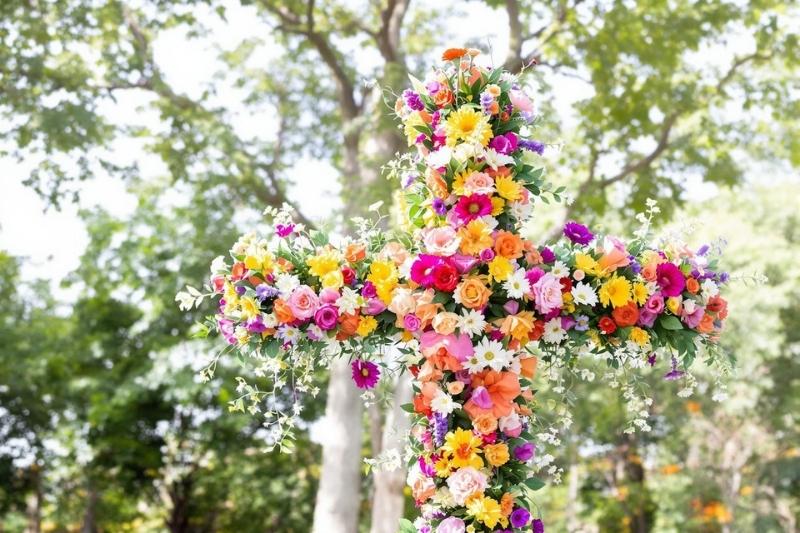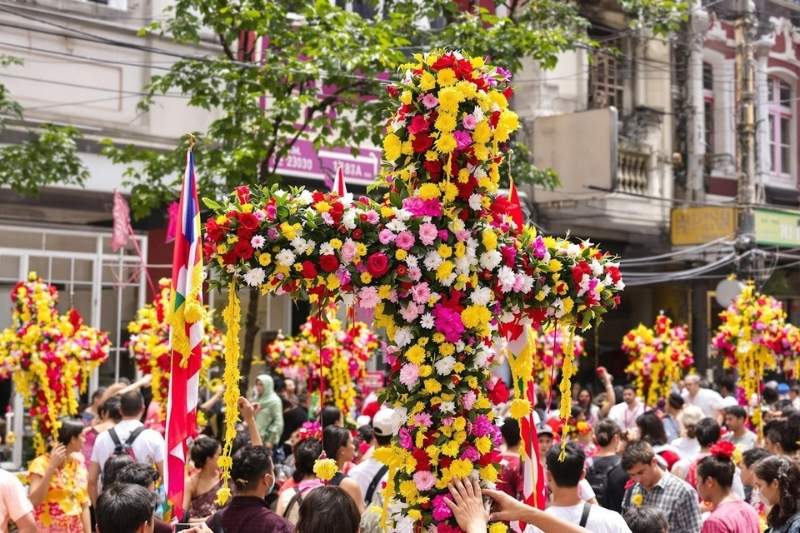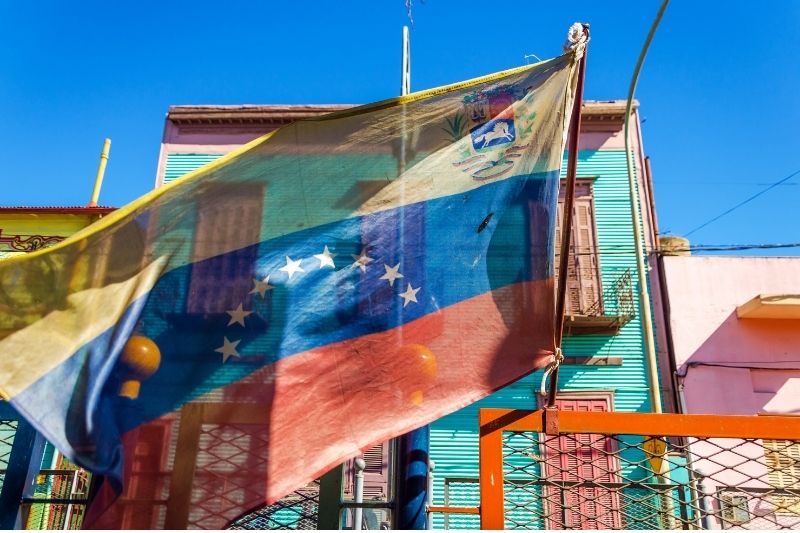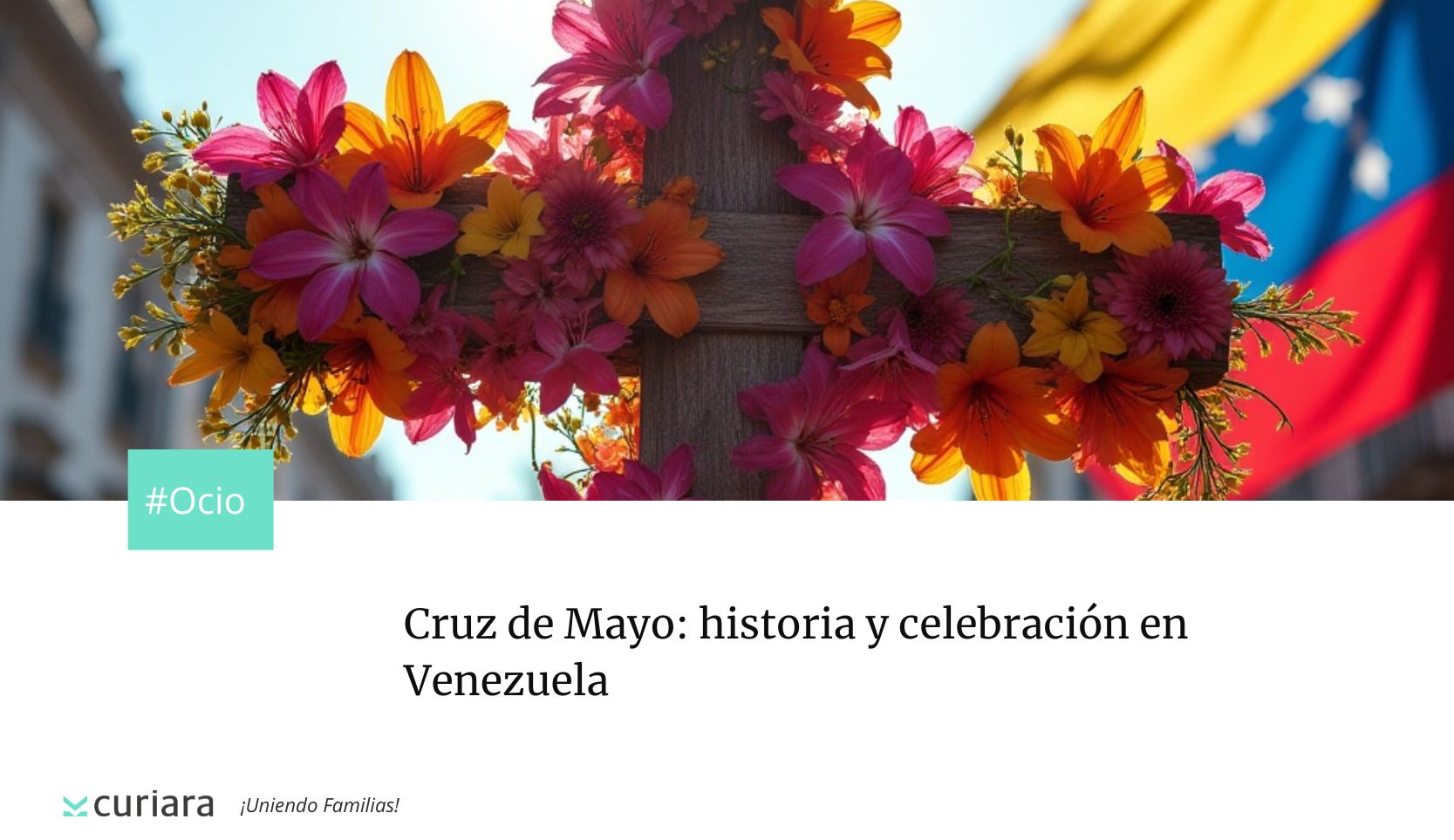The May Cross is one of those venezuelan traditions that many of us remember fondly: flowers, songs, neighbors gathered, and a simple altar.but full of faith and color.
Even if you are far from Venezuelaperhaps living in United States like so many others, this celebration continues to be a beautiful form of keeping our customs alive and feel close to what we are.
Each May 3in many regions of the country, it is surrendered to the homage to the cross as a symbol of hope, gratitude and petition for good harvests.
But beyond the religious aspect, the May Cross represents encounter, community and memory. And although life in another country changes many things, there are traditions that are worth sharing.
Origin and history of the May Cross

The celebration of the May Cross has very ancient roots. Its origin dates back to the time of colonizationwhen the Spanish missionaries arrived in America and began to teach the Catholic religion to the indigenous peoples.
For them, the cross was a sacred symbol, and they used it as part of their teachings. Little by little, the cross began to form part of the life and spirituality of the people.
Over time, this religious tradition was blended with popular beliefs, indigenous customs and a deep connection with nature. Thus was born the May Cross, as we know it today in Venezuelaa mixture of faith, culture and gratitude.
In particular, the cross is asked to bless the earth, may it bring rain and good harvests. That is why, in many regions of the country, people decorate it with flowers, fruits and colorful ribbons, as a way of offering the best of nature.
In some villages, they also sing songs known as "chants". tenths or fuliaswhich are verses that are improvised in order to pay homage to the cross. Others accompany the celebration with drums, prayers, typical foods such as hallacas, tumbarrancho arepas o queen pepiada arepascachapas and traditional sweets. It is a festival that has passed from generation to generation, and is still alive thanks to the affection and respect that those who celebrate it have for it.
The beauty of the May Cross is that, although it has a religious origin, over time it has also become a expression of identity and community. It is one of those traditions that remind us of where we come from and invite us to share who we are, even when we are far away.
Meaning and symbolism

The May Cross is not just a cross decorated with flowers. For many people in Venezuela, has a profound meaning that blends the faith, nature and hope. It is a way of giving thanks for what we have and asking for what is to come, especially for rain, crops and the welfare of the community.
Decorate the cross with fresh flowers, fruits, palm leaves or colored ribbons is not only by tradition: each of these elements represents something.
The flowersfor example, symbolize the beauty of nature and the rebirth of life. fruits and offerings are a gratitude for what has been received and a desire for abundance. Everything that is placed on the cross has a meaning: it is like a language full of affection and respect for the earth.
It is also said that this tradition has a strong link to protection. In many homes or towns where it is celebrated, it is believed that the Cruz de Mayo protects familiesto the fields and even to livestock.
For this reason, in some places, the cross remains in the same place for the whole month, and every now and then it is returned to the same place. ornament, it is sung or prayed to.
The most beautiful thing is that this symbol has become a way of uniting people. Around the cross are neighbors, friends and relatives. Food, music, stories are shared. It is a tradition that teaches us to be thankful, to ask with humility and to celebrate together, no matter how far we are from home.
Traditional celebrations in Venezuela

The way in which the May Cross in Venezuela varies somewhat from one region to another, but they all have one thing in common: the love for tradition and the desire to share in community.
In many villages, people prepare an altar where they place a cross made of wood, decorated with flowers, branches, fruit, candles and colorful ribbons. This altar can be in the home of a devout family or in a public place such as a plaza. It becomes a meeting point for neighbors and visitors.
One of the best known customs is the "wake of the cross"which is not a sad wake, but a vigil filled with music, prayers and popular songs.
It is sung throughout the evening, especially in the central region of the country, using instruments such as the four, maracas and drums. The songs can be tenths, fulias or salveswith improvised lyrics that speak of the cross, nature, faith or even social issues.
In some states, such as Miranda, Vargas, Yaracuy and Sucre, these celebrations are accompanied by typical dances, shared meals among neighbors and even processions. It is common to see children, adults and seniors participating together, which gives a very familiar and joyful air to the party.
There are also places where the cross is carried from house to housein the form of a procession. Each family receives it with respect, decorates it in their own way and dedicates prayers or songs to it before passing it on to the next family.
Beyond the details of each region, what is certain is that the May Cross in Venezuela is a lively, colorful and meaningful celebration. A tradition that mixes the spiritual with the human, and that continues to touch hearts generation after generation.
Cruz de Mayo in the Venezuelan Diaspora in the United States

For many Venezuelans living in the United States todayBeing away from home does not mean leaving traditions behind. On the contrary, in the midst of nostalgia and change, the May Cross has become a very special form of keeping alive the connection with our roots.
At cities where there is a large Venezuelan communityas Miami, Houston, Orlando or New YorkIn addition, some groups and families have organized to continue celebrating this date.
It may be in a church, in a park, or even in the living room of a house, but the spirit is the same: decorating the cross, sharing typical food, singing fulias, etc. and meet with other Venezuelans to feel a little piece of Venezuela. Venezuelaeven if only for a few hours.
Many of these gatherings have grown over the years. Some include activities for children, workshops to explain the meaning of the tradition, and spaces where youngsters can learn traditional songs and games.
For those who were born outside of the country, it is a way to cTo know and value the customs of their parents or grandparents.
There are also those who celebrate the May Cross In a more intimate way, with the family, placing a small cross at home, praying together or simply remembering how this date was lived in their hometown. In both cases, the important thing is not the size of the celebration, but the affection with which it is done.
Symbol of identity for all Venezuelans
The May Crossin the heart of the Diaspora, is transformed into a symbol of identity. It reminds us that even though the distances are great, our roots remain firm.
That we can continue to sow our customs wherever we are, and that those little things, like an ornate cross or an improvised song, have the power to unite us and make us feel at home.
At CuriaraWe hope we have taken you back, even if only for a moment, to those flowery courtyards, choir singing and sleepless nights by the Cruz de Mayo (May Cross). That simple cross, adorned with flowers and hope, remains a powerful symbol of who we are: a people full of faith, joy and love for their traditions.
From colorful altars from the east to the fulias In the center of the country, this celebration is not only part of our history, but also of our identity.
And even though life has led us to other paths, the May Cross continues to flourish in our memories, uniting hearts across borders.
Because in the end, every prayer, every hymn and every decorated cross reminds us that Venezuela is not only a place on the map, but a feeling that accompanies us wherever we are.
